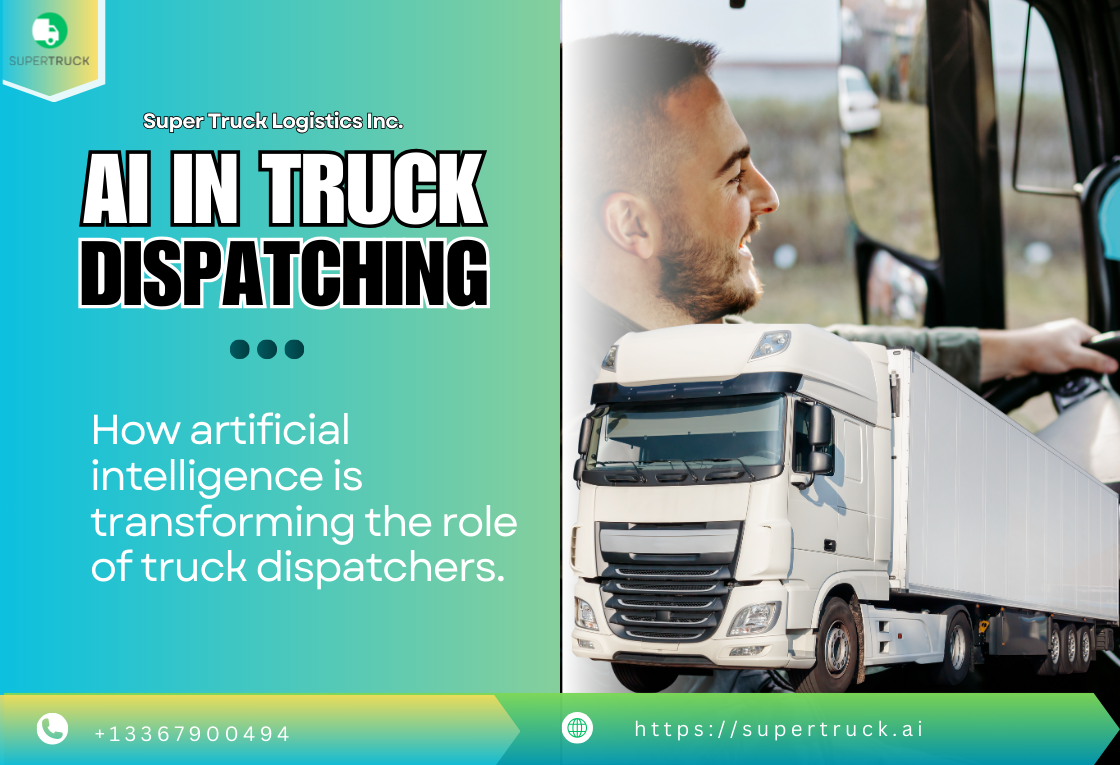
Technology

As the demand for rapid delivery and optimized routes continues to rise, businesses are turning to innovative technologies to streamline operations. One of the most transformative advancements in this sector is the integration of Artificial Intelligence (AI) in truck dispatching.
Artificial intelligence (AI) is rapidly transforming various industries, and the trucking sector is no exception. AI-powered solutions are revolutionizing truck dispatching, offering unprecedented efficiency, cost-effectiveness, and improved decision-making.
Historically, truck dispatching involved a combination of manual processes, phone calls, and paperwork. Dispatchers had to juggle multiple variables, such as routes, traffic conditions, and driver availability, often leading to inefficiencies and delays. With the rise of digital tools, the industry saw the introduction of more automated systems, but these were often limited in their capability to adapt to real-time changes. Entry of AI is a game-changer in the realm of truck dispatching. AI's ability to analyze vast amounts of data, learn from patterns, and make real-time decisions has revolutionized the dispatching process.
One of the most significant benefits of AI in truck dispatching is its ability to optimize routes. Traditional route planning relied heavily on historical data and static maps, which could not account for real-time traffic conditions or sudden road closures. AI-powered systems, however, can process live traffic data, weather conditions, and even construction updates to suggest the most efficient routes.
AI algorithms can analyze factors such as traffic patterns, historical delays, and vehicle performance to determine the best possible route. This not only reduces fuel consumption and operational costs but also ensures timely deliveries, improving overall customer satisfaction.
AI enhances visibility through real-time tracking and predictive analytics. With AI, dispatchers can monitor truck locations and status updates in real-time. This allows for proactive management of potential delays or issues, such as vehicle breakdowns or unexpected detours. Predictive analytics further leverages historical data and machine learning to forecast potential disruptions before they occur, allowing dispatchers to make informed decisions and implement contingency plans.
Driver management is another area where AI has made a substantial impact. AI systems can track driver performance, adherence to schedules, and even health metrics. By analyzing this data, AI can identify patterns that may indicate potential issues, such as fatigue or unsafe driving behaviors. This information helps in scheduling breaks, optimizing driving hours, and ensuring compliance with regulations, ultimately leading to safer and more efficient operations.
Moreover, AI can aid in driver recruitment and retention by analyzing performance data to match drivers with suitable routes and schedules, enhancing job satisfaction and productivity.
AI-driven dispatching systems contribute to significant cost reductions by optimizing fuel usage, reducing idle times, and minimizing the need for manual intervention. By automating routine tasks and making data-driven decisions, companies can operate more efficiently and reduce operational costs. Additionally, AI can help in managing resources more effectively, such as optimizing fleet utilization and scheduling maintenance proactively to prevent costly repairs.
In an era where sustainability is a growing concern, AI plays a crucial role in promoting greener logistics practices. By optimizing routes and reducing fuel consumption, AI contributes to lower carbon emissions. Furthermore, AI can aid in the adoption of electric and hybrid vehicles by analyzing their performance and integrating them into the fleet in a way that maximizes their benefits.
While the advantages of AI in truck dispatching are substantial, there are challenges to consider. Data security and privacy concerns must be addressed, as the systems rely on sensitive information. Additionally, integrating AI with existing systems and ensuring that all stakeholders are adequately trained to use new technologies can be complex.
Moreover, AI systems require continuous updates and maintenance to ensure accuracy and effectiveness. Companies must be prepared for ongoing investments in technology and training to fully reap the benefits of AI in truck dispatching.
As technology continues to evolve, the role of AI in truck dispatching is expected to expand further. Innovations such as autonomous vehicles and advanced machine learning algorithms will continue to drive improvements in efficiency, safety, and sustainability. For companies in the logistics industry, embracing AI is not just an option but a necessity to stay competitive in a rapidly changing market.
No comments yet. Be the first to comment!
05 Aug 2024
14 Aug 2024
14 Aug 2024
14 Aug 2024
16 Aug 2024
20 Aug 2024
21 Aug 2024
22 Aug 2024
23 Aug 2024
25 Aug 2024
25 Aug 2024
26 Aug 2024
26 Aug 2024
27 Aug 2024
28 Aug 2024
29 Aug 2024
01 Sept 2024
01 Sept 2024
02 Sept 2024
03 Sept 2024
04 Sept 2024
05 Sept 2024
06 Sept 2024
08 Sept 2024
09 Sept 2024
10 Sept 2024
12 Sept 2024
13 Sept 2024
07 Oct 2024
17 Oct 2024
18 Oct 2024
22 Oct 2024
29 Oct 2024
05 Nov 2024
06 Nov 2024
08 Nov 2024
11 Nov 2024
19 Nov 2024
20 Nov 2024
©copyright 2024, supertruck.ai